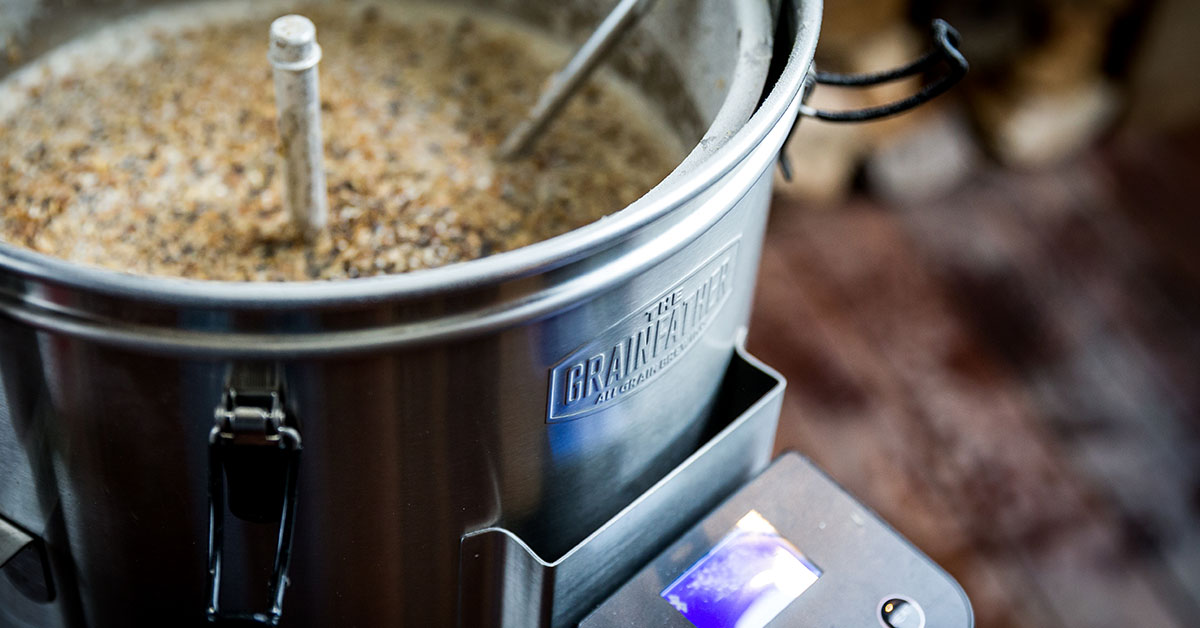We often get asked if you can do decoction mashing with the Grainfather, the good news is that it can be done, is it easy? Yes… but it requires much more planning and attention.
So what is decoction mashing? Well, it starts with brewing being a very old process, that outdates most of the modern equipment and knowledge that we take for granted today. The key one being thermometers, without thermometers how did these brewers know what temperature they were mashing? Moreover, how could they make this process repeatable? The answer was decoction mashing where about a third of the grain and water were separated from the mash and brought to the boil for a period before being reintroduced to the main body of the mash. Because boiling water is a fixed temperature point and the volume of mash separated out was kept fixed, it made for very stable and reliable temperature steps that could be calculated. The technique had an added befit that it provided better breakdown and solubilization of the starches of the less modified malts.
There is much debate these days over the use of decoction mashing because the modern malt is a lot more modified thanks to the maltster than when this technique was originally developed. Therefore many believe that the same results can be achieved with a multi-step infusion mashing and for the most part I believe this is correct until you are comparing two similar beers one made by infusion and one made by decoction
With decoction mashing, you need to calculate the how much heat is in the tun, how much is removed by the decoction volume, and how much heat that decoction volume adds when added back to the main mash. These calculations are much more difficult than the calculations associated with infusion mashing. The key calculation being, the amount of fully wetted grains and water pulled from the main mash and the volume they contain.
The equation for the volume of the total quantity of the mash (Vm) is:
Vm = G x (Rv + 0.38) For Pounds per quart
Vm = G x (Rv + 0.8) For Kilograms per litre
G = dry weight of grain (lb or kg)
Rv = water to grain ratio of the mash (qt/lb or L/kg)
The Equation for estimating the volume of decoction to pull and then put back into the mash (Vd) is:
Vd = Vm x[ ]
Vd = Volume of the decoction
Vm = quantity of the mash
Td = Temperature of the decoction (boiling)
T2 = target temperature of the next rest
T1 = Current temperature of the mash
To do a Decoction mash on the Grainfather, you will need:
- Grainfather
- A 2.6 gal (10L) stockpot and some way to heat it, e.g. kitchen stove or gas burner
- 1 quart (1L) Pyrex glass measuring cup
- 1 ladle
- Thermometer
Recipe Märzen:
It’s a little late for brewing an October fest beer, but Christmas is fast approaching we will do a fest style beer with a double decoction.
Stats
| Volume 23L (5 Gal) | OG: 1.056 | FG: 1.011 | Est ABV: 5.9% |
| Boil time: 90mins | Mash time: 130mins | Mash Temps: 50, 65, 750C | IBU: 22 |
| Mash water:20.1L | Sparge water:14.3L | ||
Fermentables
- 4.0kg (8.2lb) Pilsner malt
- 1.4kg (3.09lb) Munich Malt
- Carahell or Carapills 0.3kg (0.66lb)
- CaraMunich II 0.45kg (0.99lb)
Hops
- 50.00g Saaz Pellet Boil 60 mins
- 20.00 Saaz Pellet Boil 20mins
Yeast
- 2.0 packets Mangrove Jack’s Bavarian Lager M76
Fermentation
- Fermentation 12-14 days 100C
- Diacytel rest two days 160C
- Lager 5 weeks at 40C
Calculations for the mash:
Mash Step one (500C)(1220F): Infusion step using the normal method on the Grainfather.
Rv = 20.1L / 6.15kg = 3.27
Vm = G x (Rv + 0.8) = 8.19
Mash Step Two (650C)(1490F):
Vd = Vm x[ ] = 8.19 x [] = 2.46L of thick mash for the decoction
Mash Step Three (mash out) (750C)(1670F):
Vd = Vm x[ ] = 8.19 x [] = 2.34L of thick mash for the decoction
Now that the calculations are done next we can move onto the decoction brew day itself.
